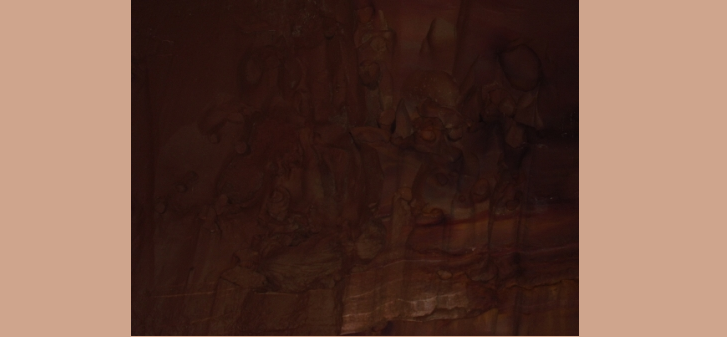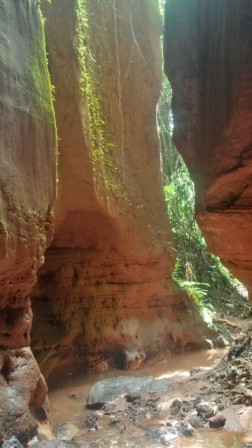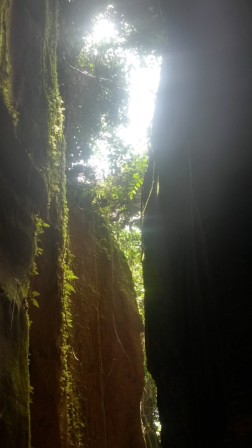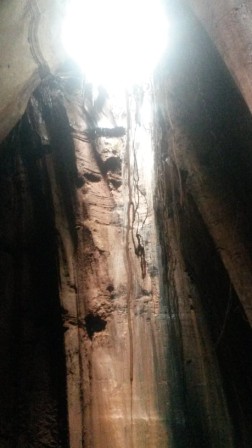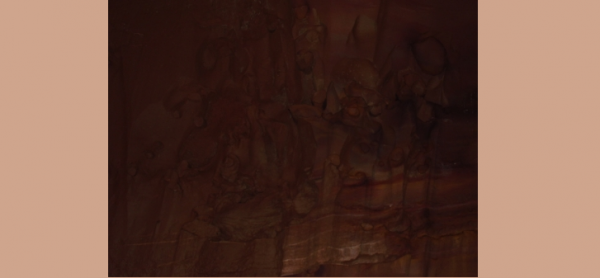For Democracy Day weekend at the end of May we planned a road trip to Enugu. We left Lagos at about 8.30am and arrived our hotel at Independence Layout, Enugu, sometime around 7pm. Take out the bad roads and time spent stuck in traffic and we would have got to Enugu much sooner.
We stayed at Utopia Suites. Our hotel accommodation cost less than ₦7000 per room for both nights, thanks to our Jovago discount. Utopia Suites did not live up to its name, though – from dirty looking sheets and bath tubs to an apparent one-towel-per-room policy, and other small inconveniences, Utopia was one of the unpleasant hotels we’ve encountered on our travels.
Our time in Enugu was pretty short. Due to the distance from Lagos, we knew we would spend two days travelling and have only one day to explore. One thing we made sure to do was partake of the food of the area. I tried okpa for the first time (I’d come across it many times before but had never bothered to), and some of us got a first taste of abacha from a roadside bar.
We set out from the hotel around 11 on our first morning with a plan to visit Udi Hills, Ngwo Caves and Waterfall and Ezeagu Waterfall/Tourist Complex. We figured out, with maps and with the help of some policemen and passers-by, that Ngwo caves was closest to our starting point (it was about 45 minutes away), and so with the policemen pointing the way we headed off onto a narrow, winding road. The bends were breathtakingly sharp, and to our right was a drop of several feet. We couldn’t go any faster than about 20km/h. Where we didn’t have trees blocking our vision, the view was amazing, with hills and the city’s buildings dotting the landscape. It was exhilarating, and a little scary. Not the kind of road you want to be on with any kind of trouble.
We reached a roadside fuel station, and there we picked up a man who knew where we were headed and offered to take us there. The winding road took us further, into Hill Top, Ngwo, and from there we made our way to the pine forest. There, we were met by two men who wouldn’t let us through; they were asking for a ₦5,000 ‘entry fee’. There was no official entryway or booth, or a ticketing system, just these two guys trying to fleece people. We haggled a bit, threatened to leave, and were able to get in for much less.
The pine forest consists of neat rows of trees. The canopy created by their branches and leaves overhead gives an ethereal feeling. We came across groups of people praying, and at least two wedding parties taking post-ceremony pictures. We invited ourselves to take a picture with a lovely couple who didn’t seem to mind.
One of the men who’d demanded money from us became our unofficial guide. He took us down a long path in the bush, sometimes steep and sometimes rocky (it was like a less extreme version of our Erin Ijesha adventure). He’d said there was an easier path through the pine forest, but that it would take much longer. We had plans to visit other places so we chose the quicker route. It was a difficult path, though; so with the luxury of time, the pine forest would be the easier and more scenic choice. At some point it started to feel like the guide might be leading us into an ambush in the forest.
Eventually, we arrived at a clearing. The waterfall and caves are tucked in a narrow cavity that opens into a small circular space. It’s like being in a dark room with a small skylight, the water falling from the hole in the roof of the cave and down into a pool that forms into a stream. It’s a small waterfall; you can get close and even stand under it.
The cave has an air of mystery to it, and its walls look like burnt clay. Our guide stood to one side smoking weed and saying nothing, so we had no commentary to go with the sights. I doubt he could have told us much anyway. We had our fill of the caves, took several pictures and made our way back out.
When we left Ngwo we decided to head to Ezeagu. We’d read about a place called Ezeagu Tourist Complex, with caves and a waterfall. Nobody we asked knew an Ezeagu Tourist Complex, but they knew Ezeagu Waterfall, and we figured this was close enough. We found our way with the help of an okada rider. Apparently, it was quite a popular spot.
We found out just how popular when we got to the gatepost leading to the waterfall area. There were several buses parked, most bearing logos from University of Nigeria, Nsukka, and we could hear party music in the distance. When we got to the waterfall there was a massive crowd of young bodies, some frolicking in the water, others dancing or drinking or smoking. There were three deejay posts, with different music blaring from each of them like there was some kind of contest going on.
Unfortunately, we could not stay long – the teeming crowd, the loud music, the partying students, it just wasn’t very inviting. But it looked like a beautiful waterfall, from what we could see of it.
As always, this was a great exploring; I only wish we’d had time to visit more of the attractions Enugu has to offer.
Photo credit: Yellow Mitsubishi

